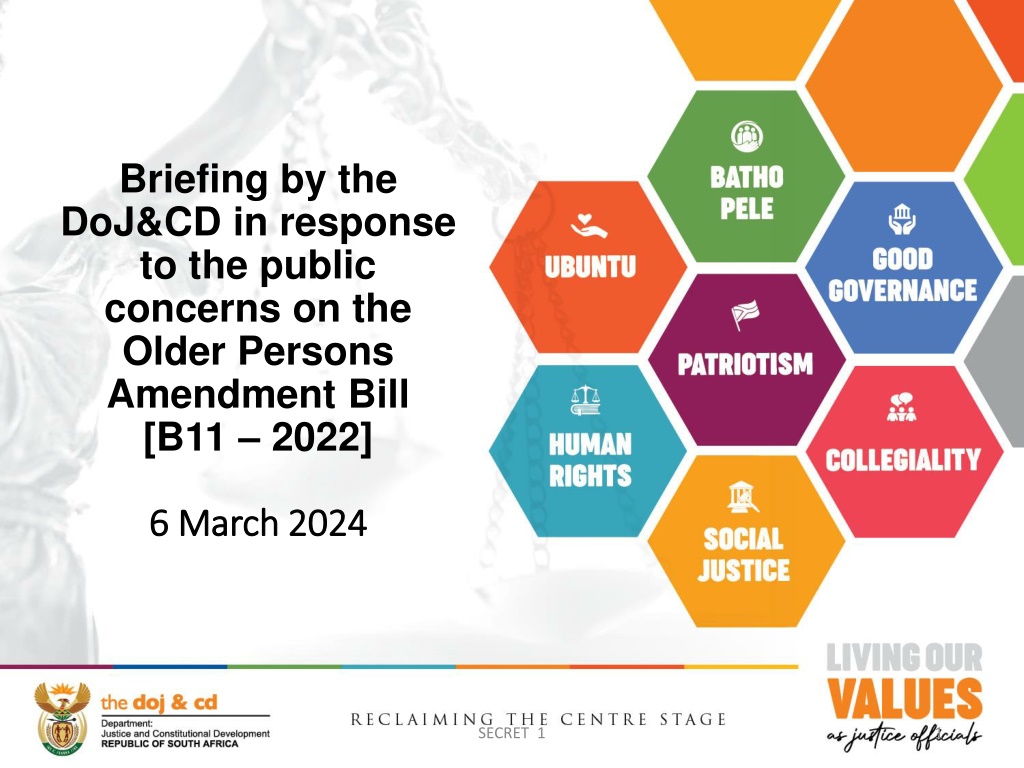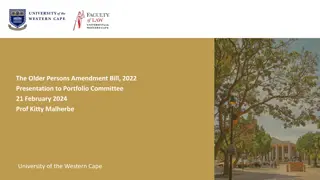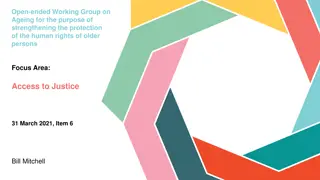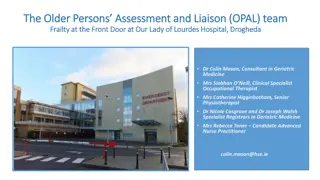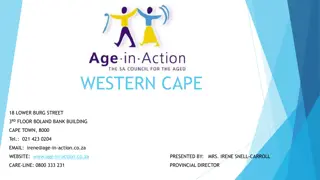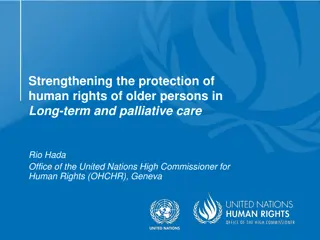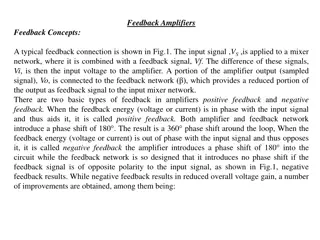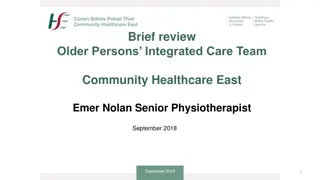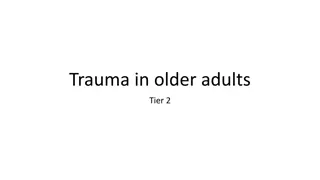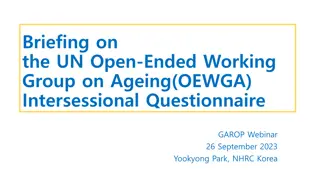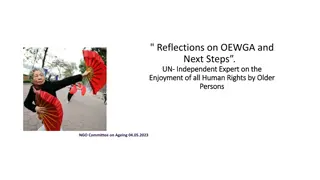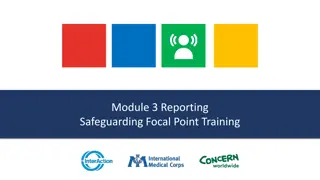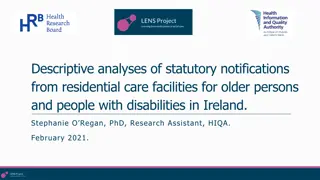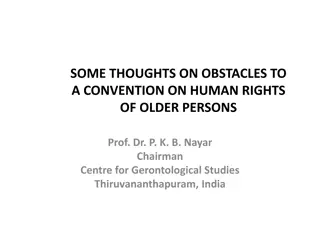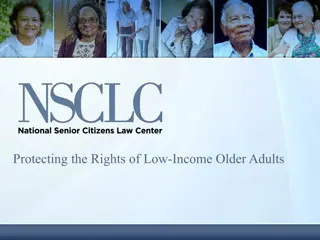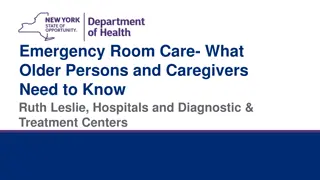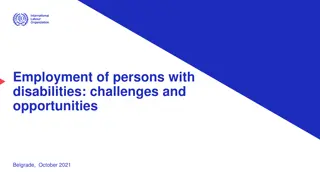Addressing Concerns on Older Persons Protection: Response to Public Feedback
The Department of Justice and Constitutional Development responds to public concerns on the Older Persons Amendment Bill. The presentation focuses on key issues such as property rights, coercion, legal fees, and accessibility for older persons. Legal frameworks, including clauses in the bill and relevant laws like the Constitution and the Domestic Violence Act, are highlighted to safeguard older persons' rights. Solutions like special training for court clerks, closer courts to communities, and assistance programs for property transfers are presented to ensure protection for older individuals.
Download Presentation

Please find below an Image/Link to download the presentation.
The content on the website is provided AS IS for your information and personal use only. It may not be sold, licensed, or shared on other websites without obtaining consent from the author. Download presentation by click this link. If you encounter any issues during the download, it is possible that the publisher has removed the file from their server.
E N D
Presentation Transcript
Briefing by the DoJ&CD in response to the public concerns on the Older Persons Amendment Bill [B11 2022] 6 March 2024 6 March 2024 SECRET 1 1
Purpose of the Presentation To provide the Committee with responses to the following concerns and recommendations raised during the public hearings conducted on the Older Persons Bill: The law does not protect older persons when it comes to their property rights. Older persons are often coerced by family members to surrender their houses/properties. Older persons cannot afford legal fees associated with the transfer of assets of their deceased spouses. Court Clerks should receive special training in order to understand the challenges faced by older persons i.e., some older persons are struggling with disorders such as dementia. Courts should be brought closer to communities so that they can be accessible to older persons. There should be sign language interpreters at courts .
The law does not protect older persons when it comes to their property rights
RELEVANT LEGAL FRAMEWORK Clause 7B of the Older Persons Bill: An older person has the right to protection against (a) any form of violence, sexual abuse and discrimination based on gender; (b) abuse related to property and land rights; and (c) abuse related to the right to inheritance. The property rights of the older persons are protected by section 25 of the Constitution: No one may be deprived of property except in terms of law of general application, and no law may permit arbitrary deprivation of property. Domestic Violence Act (DVA), 1998 (Act No 116 of 1998) Section 1 includes elder abuse in the definition of domestic violence; In terms of the DVA, any person, incl an older person, is subjected to economic abuse when a property that he/ she has an interest in is disposed without consent It is an act of domestic violence to coerce any person, incl an older person, to do or abstain from doing something that he or she has a lawful right to do, e.g. retaining a property. In such instances, the older person may apply for a protection order against the abuser with whom he/ she is in a domestic relationship.
What if older persons cannot afford legal fees associated with the transfer of assets of their deceased spouses? Registration of immovable property in deceased estate In terms of section 39(3) of the Administration of Estates Act, 1965 (Act 66 of 1965) provides: If any heir is unable or could not without hardship be required to pay the costs involved in having any immovable property to which he is entitled according to a distribution account, registered in his name, the Master may authorize the executor to cause a note that the property has been bequeathed or inherited, as the case may be, to be endorsed against the title deeds of the property. The Office of the Chief Master has agreements with pro bono attorneys to assist with the transfer of immovable property without the charge of executor s fee. The Chief Master also signed MoU with Legal Aid SA to assist where the estate qualifies in terms of the means test. However, certain Deeds Office costs will still have to be paid by such estate.
Clerks of the Court should receive special training to understand challenges faced by older persons
The Department developed a Handy Hints Guide for Court Clerks to sensitise them of the rights of the older court users, The Guide further sensitises court clerks of the possible physical, emotional and cognitive impairments that often face older persons. It also sets out reasonable accommodations with corelating support services, which the older court users may require when in court; Justice College is at the final stages of developing a training module, and is awaiting the promulgation of this Bill into law. A training programme will be conducted as soon as this Bill becomes law.
Courts should be brought closer to communities
Rationalisation of the Magisterial Districts and Divisions of the High Court The Department is about to finalise a project for the Rationalisation of the Magisterial Districts and Divisions of the High Court. The Project is intended, inter alia, TO: o Address the pre-1994 spatial planning that was informed by apartheid to fragment and differentiate communities along racial and ethnic lines; o Consider distance, transport routes and costs, as well as the predominant language in a particular community, so as to ensure equal and equitable access to court services. During the period 2014 to 2018, the rationalization of the magisterial districts of GP, LIMP, MPUM, and NW provinces was finalised. All provinces have been aligned to the District Development Model (DDM), and the implementation of the rationalisation of EC, FS, KZN, WC will be finalised before May 2024. The major aim of this Project is to bring access to justice closer to people, particularly to the older persons, persons with disabilities and other vulnerable persons.
There should be sign languages at courts
With effect from 5 August 2022: (Criminal and Related Matters Amendment Act, 2021) Gesture-language is now considered as viva voce/ oral evidence; Demonstrations, gestures or any other form of non-verbal expression, including the use of devices to communicate, are allowed as viva voce / oral evidence. A witness under the age of 18 years or a witness who suffers from a physical, psychological, mental or emotional condition, which inhibits the ability of such witness to give his or her evidence viva voce, may use demonstrations, gestures or any non-verbal expression, including the use of devices to communicate when testifying. Currently, there are very few cases that require sign language interpreters, and this minimal caseload does not justify the full-time appointment of sign language interpreters. For this reason, the Department has partnered with reputable organisations to provide this service, as and when it is required. Each court is required to keep a database of ad hoc sign language interpreters.
The Department is also implementing the Minimum Standards on Reasonable Accommodations and Measures to Access Justice for Court Users with Disabilities, which provide the following: Ad hoc sign language interpreters Wheelchair ramp Elevators Disability ablution facility Demarcated area for guide dogs and court accompanying person Educational info in braille, large print, easy read format, pictorial graphics Audio material Reasonable accommodation officer Reasonable Accommodation register Intermediary services Handy Hints Guide for Access to Justice for PWD (for frontline officials in courts) Upgraded 149 courts in line with the Minimum Standards
Other Recent Legal Developments Towards an Age-Centric Justice System With effect from 5 Aug 2022, Intermediary services are now extended to older witnesses and witnesses with certain disabilities, i.e. persons who suffer from a physical, psychological, mental or emotional condition. Intermediary services are also now being provided in civil proceedings. Previously, they were limited to criminal cases. Court accompaniment person receives witness fees (travelling + food allowance)
With effect from 5 August 2022, an older witness may testify virtually
Other Recent Legal Developments: Mandatory Reporting in Certain Cases against Adult Persons Sexual Offences: Any person who has knowledge, reasonable belief, or a suspicion that a sexual offence has been committed against a vulnerable person must report such to a police official. A vulnerable person includes: An older person who receives community-based care and support services, other than from a family member, from a facility or lives in such facility to receive such services (s54 of the Criminal Law (Sexual Offences and Related Matters) Amendment Act, 2007); Domestic Violence: Any person who believes or reasonably suspects that an older person may be a victim of domestic violence, must report such to a social worker or police official (s2B of DVA) Failure to report amounts to a punishable crime.
LIMITATIONS AND POSSIBLE SOLUTIONS There s high attrition in cases involving older persons. In many instances, they prefer to forgive perpetrators and disappear from the court system. High charge withdrawal rate in cases involving older persons. Court accompaniment services: Certain older persons require court accompaniment services. The Department now recognises such services, and pays witness fees (travelling and food allowance) to persons rendering such service. However, the request to provide such service must be made and authorised by the prosecutor. Court clerks do require an intensive training on the Older Persons Act. Justice College is awaiting the promulgation of the Bill before finalising the development of the Older Persons Module. In the meantime, court clerks are using the Handy Hints Guide to deal with Older Persons when in court.
